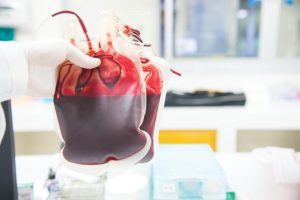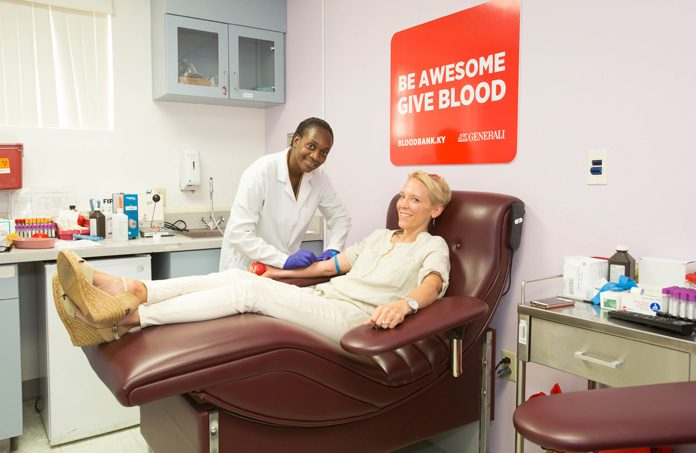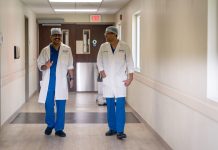Giving the gift of life is easier than you think. Donating blood or signing up to a bone marrow registry will take only minutes of your time but has the potential to make a substantial, sometimes lifesaving, difference to the lives of others.
Blood donations
 Donating blood is a simple process that does not consume a lot of time, yet the importance of it to others can be life-changing. Cancer patients, sickle cell patients, surgical patients, accident victims, orthopedic and obstetric patients are just a few who benefit from donated blood, and in 2018 516 lives in Cayman were saved or improved as a result of blood transfusion.
Donating blood is a simple process that does not consume a lot of time, yet the importance of it to others can be life-changing. Cancer patients, sickle cell patients, surgical patients, accident victims, orthopedic and obstetric patients are just a few who benefit from donated blood, and in 2018 516 lives in Cayman were saved or improved as a result of blood transfusion.
The HSA Blood Bank at the Cayman Islands Hospital collects over 1,000 units of blood per year. In terms of gallons, that is over 125 gallons, and more is needed. While donor numbers are increasing and importation of blood and blood products is decreasing, only 2.4 percent of the eligible 30 percent of the population are donating.
Criteria
There are some criteria for the public who wish to donate, which are in-line with international standards and not imposed only in the Cayman Islands.
Donors must be at least 18, or 17 with parental consent, weigh more than 110 lbs, and be fit and in good health. You will find out for sure if you are eligible to donate on the day after a mini-physical exam and health history questionnaire and tests for hemoglobin and blood pressure, which aim to protect both the donor and future recipients of the blood.
Certain medical conditions, and previous or present residence in health risk areas, such as malaria endemic areas, may exclude potential donors. Persons who visited or lived in the UK between Jan 1, 1980 and Dec 31, 1996 for a cumulative time of 3 months, or received a blood transfusion in the UK or France since Jan 1, 1980 are excluded from donating blood because of the risk of transmitting variant Creutzfelt-Jacob disease (vCJD) for which no test is available for detection. The same also applies to those who lived in or visited the rest of Europe from Jan 1, 1980 to present and spent a total of five years or more there, including time spent in the UK.
Routine tests are performed on the blood to ensure that it is safe for transfusion and won’t transmit any infectious materials. These routine tests include ABO and Rh group, Red blood cells antibody detection, HIV, HTLV, Hepatitis B and C and syphilis.
Advice
The HSA recommends donors have regular meals and drink at least 16 oz of fluids 30 minutes before donation to help prevent fainting. After donation, the donor will be given some fluids to quickly replace the lost blood volume and be told to rest for about 15 minutes under observation. The donor will also be advised to continuously drink fluids throughout the rest of day, forego any strenuous activities, such as jogging or weight lifting, not smoke or drink alcohol for a few hours after donating and not to lift heavy items using the affected arm.
To check if you are an eligible donor or to book an appointment to donate, please visit www.bloodbank.ky or call the Cayman Islands Blood Bank at 244-2674. You can also walk-in. The Blood Bank is located on the second floor of the Cayman Islands Hospital and is open Monday – Friday 7:00am – 6:30pm and Saturday 9am – 5pm. It is closed on Sunday and Public Holidays.
Bone Marrow
Bone marrow and stem cell transplants are often necessary for leukemia and sickle cell anemia patients, as well as those with other blood disorders.
There are two methods of donating bone marrow and stem cells for these purposes. Donors either donate peripheral blood stem cells by receiving a treatment to stimulate the production of these stem cells in their body. They are then harvested by a non-surgical procedure to draw blood from the donor’s arm, and the blood is then passed through a machine to remove the specific white cells and return the rest of the blood to the donor’s body.
For bone marrow transplants, donors undergo a minor surgical procedure on their pelvic bone under anesthesia, where liquid marrow is removed with a needle. The marrow replenishes in 4-6 weeks.
The Cayman Islands Cancer Society is partnering with an international registry to recruit bone marrow and stem cell donors. Details are currently being organized with the plans to begin donor drives in 2019.
The diverse mix of ethnicities and genetic makeup in the Caribbean region makes it difficult for those in need of a donor to find a match. More people signing up to the registry will increase the chances of a match as matches are more likely in those who share the same ethnic background or ancestry.
Joining the registry involves filling in a registration form and having a cotton-tipped swab of cheek cells taken. The process takes 10 minutes and could change or save someone’s life in our region in the future. People aged between 18 and 60 and in good health can register. The Cayman Islands Cancer Society covers the $75 cost of registration although welcomes donors to cover the cost if they are financially able. The registration cost covers the kit, postage, lab work and addition of results to the worldwide registry.
In the event that donors are matched with an individual in need of a marrow, stem cell transplant or product therapy, more testing will be done and consent needed to proceed.
Community donor drives offer a place to find out more and to register, and companies, churches, organizations or other groups will be able to arrange for drives to be set up at their facility.
While mass-collections and registrations are preferred, eager individual would-be donors can visit the Cayman Islands Cancer Society from 12 p.m. to 1 p.m. Monday to Friday to find out more.
For more information contact the Cayman Islands Cancer Society on 949-7618 or email [email protected].
Organ Donation
The Human Tissue Transplant Law has come into effect in the Cayman Islands.
The issue of human tissue transplants was first reviewed in 2005 by a government-appointed committee and came to the fore again when Dr. Devi Shetty proposed Health City Cayman Islands. The organ transplant proposal was also brought up and approved in a private members’ motion filed in the Legislative Assembly during 2010 by MLA Ellio Solomon.
The Human Transplant Law was then gazetted in 2013, seeking to regulate the donation of organs and human tissue for medical purposes in the Cayman Islands, and came into legal effect July 31, 2018 making it easier for tissues transplant procedures to be performed on-island.
In practice, tissue transplant surgeries have been performed in Cayman since 2013. However, tissues or organs could not be harvested here and sourcing them from overseas is a complex and time-consuming process. Often, patients find they must go overseas to either obtain the needed tissue or for the surgeries, or both.
Government appointed a Human Tissue Transplant Council, following a public comment period and approval by Cabinet of regulations to the law. The council members will create a register that not only allows organs and tissues donated to be kept in Cayman, but which would also allow the British Overseas Territory to become part of an international donation network for human tissue.
The council is chaired by local attorney Gina Berry, and also includes Dr. Diane Hislop-Chestnut, Reverend Nicholas Sykes, the Commissioner of Police or his designate and Robert Hamaty, a heart transplant recipient.
The full Human Transplant law can be viewed at http://www.gov.ky/portal/pls/portal/docs/1/11525743.PDF
Regulations
- Tissue donation will only be done on a voluntary basis.
- Tissues or organs will be harvested from a deceased person only if a licensed medical practitioner is satisfied that the person gave consent to do so while they were still alive.
- Consent must be given to remove organs or tissue from a human body.
- The law prohibits someone from removing tissue or organs from those who cannot legally give consent.
- Only those 18 and older may register as organ donors. Children can donate regenerative body tissue, but only with parental consent.
- The legislation does not apply to fetal tissue, sperm or ova.
- The law makes illegal trading of human body parts a crime.
- The Human Tissue Transplant Council will review the process of tissue donation and transplants, including inspections of any animal tissue imported into Cayman that would be used during transplant surgery.








